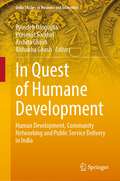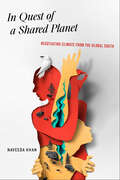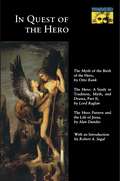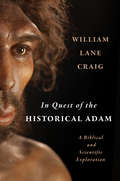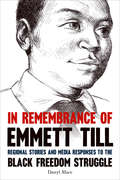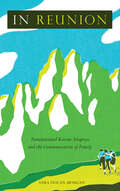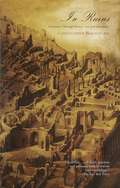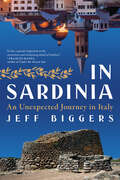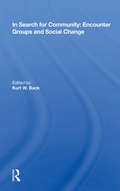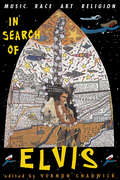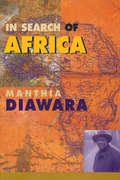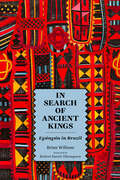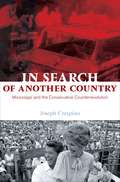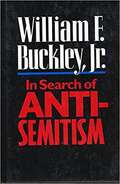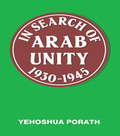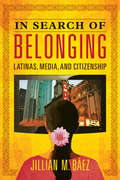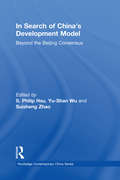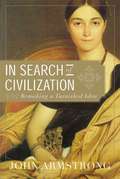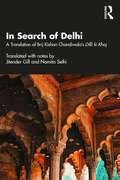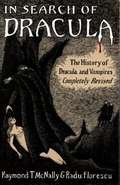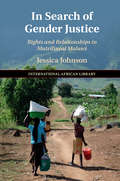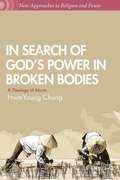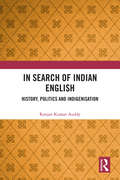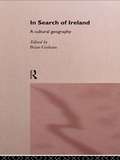- Table View
- List View
In Quest of Humane Development: Human Development, Community Networking and Public Service Delivery in India (India Studies in Business and Economics)
by Byasdeb Dasgupta Archita Ghosh Bishakha Ghosh Prasenjit SarkhelThis book presents a multidimensional perspective on the interlinkage between human development, community characteristics and public service delivery with special reference to India. The chapters in the book analyze the influence of public service delivery on human development from neo-classical as well as Marxian point of view. Thus, the expositions in the book provides a balanced mix of macro and micro approaches in the study of development. The analytical discussions are supplemented by case studies and empirical estimates so as to demonstrate the applicability of the theory and the theoretical discourse about human development, community network and the success and failures of critical public services in the Indian context. The methodology followed in the chapters involves critical survey of existing literature, case studies, field survey and use of econometric techniques as well as statistical tools of index construction. While contributors are primarily scholars from neo-classical economics discipline, some are intellectuals from the field of political economy and development studies. Given the wide array of development perspectives, this book is of interest not only to students and researcher of development economics, social science and management, but also a valuable reading for development practitioners and policy makers, who would be interested in understanding how community and public institutions interact to determine access to health, education and social security services that shapes the wellbeing of disadvantaged populations. The lessons and implications are extremely pertinent to other emerging economies, in particular those in South Asia.
In Quest of a Shared Planet: Negotiating Climate from the Global South
by Naveeda KhanBased on the author’s eight years of fieldwork with the United Nations-led Conference of Parties (COP), In Quest of a Shared Planet offers an illuminating first-person ethnographic perspective on climate change negotiations. Focusing on the Paris Agreement, anthropologist Naveeda Khan introduces readers to the only existing global approach to the problem of climate change, one that took nearly thirty years to be collectively agreed upon. She shares her detailed descriptions of COP21 to COP25 and growing understanding of the intricacies of the climate negotiation process, leading her to ask why countries of the Global South invested in this slow-moving process and to explore how they have maneuvered it.With a focus on the Bangladeshi delegation at the COPs, Khan draws out what it means to be a small, poor, and dependent country within the negotiation process. Her interviews with negotiators within country delegations uncover their pathways to the negotiating tables. Through observations of training sessions of negotiators of the Global South, Khan seeks to reveal understandings of what is or is not achievable within negotiated texts and the power of deal-making and deferrals. She profiles individuals who had committed themselves to the climate negotiation process, moving between the Secretariat, Parties, activists, and the wider UN system to bring their principles, strategies, emotions, and visions into view. She explores how the newest pillar of climate action, loss and damage, emerged historically and how developed countries attempted to control it in the process. Khan suggests that we understand the Global South’s pursuit of loss and damage not only as a politics of forcing the issue of a conjoined future upon the Global North, but as a gift to the youth of the world to secure that future.With this book Khan hopes to rekindle an older way of doing politics through the tenets of diplomacy upheld by the UN that have been overshadowed of late by the politics of confrontation. She stresses that while the tension between efforts of equity and solidarity and global economic competition, which have run through the negotiation process, might undercut the urgency to carry out climate mitigation, it needs to be addressed for meaningful and sustainable climate action.Deeply insightful and highly readable, In Quest of a Shared Planet is a stirring call to action that highlights the key role responsive and active youth have in climate negotiations. It is an invitation not only to understand the climate negotiation process, but also to navigate it (for those planning to attend sessions themselves) and to critique it—with, the author hopes, sympathy and an eye to viable alternatives.In Quest of a Shared Planet: Negotiating Climate from the Global South is available from the publisher on an open-access basis.
In Quest of the Hero: (Mythos Series) (Mythos: The Princeton/Bollingen Series in World Mythology #143)
by Alan Dundes Otto Rank Fitzroy Richard RaglanIn Quest of the Hero makes available for a new generation of readers two key works on hero myths: Otto Rank's Myth of the Birth of the Hero and the central section of Lord Raglan's The Hero. Amplifying these is Alan Dundes's fascinating contemporary inquiry, "The Hero Pattern and the Life of Jesus." Examined here are the patterns found in the lore surrounding historical or legendary figures like Gilgamesh, Moses, David, Oedipus, Odysseus, Perseus, Heracles, Aeneas, Romulus, Siegfried, Lohengrin, Arthur, and Buddha. Rank's monograph remains the classic application of Freudian theory to hero myths. In The Hero the noted English ethnologist Raglan singles out the myth-ritualist pattern in James Frazer's many-sided Golden Bough and applies that pattern to hero myths. Dundes, the eminent folklorist at the University of California at Berkeley, applies the theories of Rank, Raglan, and others to the case of Jesus. In his introduction to this selection from Rank, Raglan, and Dundes, Robert Segal, author of the major study of Joseph Campbell, charts the history of theorizing about hero myths and compares the approaches of Rank, Raglan, Dundes, and Campbell.
In Quest of the Historical Adam: A Biblical and Scientific Exploration
by William Lane CraigWas Adam a real historical person? And if so, who was he and when did he live? William Lane Craig sets out to answer these questions through a biblical and scientific investigation. He begins with an inquiry into the genre of Genesis 1–11, determining that it can most plausibly be classified as mytho-history—a narrative with both literary and historical value. He then moves into the New Testament, where he examines references to Adam in the words of Jesus and the writings of Paul, ultimately concluding that the entire Bible considers Adam the historical progenitor of the human race—a position that must therefore be accepted as a premise for Christians who take seriously the inspired truth of Scripture. Working from that foundation of biblical truth, Craig embarks upon an interdisciplinary survey of scientific evidence to determine where Adam could be most plausibly located in the evolutionary history of humankind, ultimately determining that Adam lived between 750,000 and 1,000,000 years ago as a member of the archaic human species Homo heidelbergensis. He concludes by reflecting theologically on his findings and asking what all this might mean for us as human beings created in the image of God, literally descended from a common ancestor—albeit one who lived in the remote past.
In Real Life: Love, Lies & Identity in the Digital Age
by Nev SchulmanFrom the host of MTV's #1 show Catfish comes the definitive guide for millenials about how to connect with people authentically in today's increasingly digital world. IN REAL LIFE: Love, Lies, and Identity in the Digital Age Nev Schulman is beloved. He is the host of the wildly popular TV series Catfish which investigates online relationships to determine whether they are based on truth or fiction (spoiler: it's almost always fiction). Nev has become the Dr. Drew of online dating for millenials; his fans view him as the ultimate authority on this subject matter. Nev's clout in this area springs from his own experience with a deceptive online romance, about which he made a critically acclaimed 2010 documentary (also called Catfish). In that film Nev coined the term "catfish" to refer to someone who creates a false online persona to reel someone into a romantic relationship. The meme spread rapidly. Now Nev takes his investigation to the page, providing readers with an essential roadmap to better connect their digital personas with their true selves. Peppered throughout with Nev's personal stories, this book will explore relationships in the era of social media. Specifically the book will tackle:-what motivates catfish-why people fall for catfish-how one can avoid being deceived-online accountability-Nev's rules for dating-how to connect authentically with people over the internet-how to turn an online relationship into a real life relationship, and much more.Nev will delve deeply into the complexities of dating in a digital age, and continue the cultural dialogue his show has begun about how we interact with each other through social media versus in person-- specifically in relation to millennials, who have never known a world without Facebook. Nev has his finger on the pulse of today's youth. He understands how they interact with each other and what they're looking for. Nev will explore the pressing issue of connectivity versus genuine connection which is plaguing young people's relationships with each other, and he will provide the advice that his fans have been desperately seeking.
In Remembrance of Emmett Till: Regional Stories and Media Responses to the Black Freedom Struggle (Civil Rights and the Struggle for Black Equality in the Twentieth Century)
by Darryl MaceThis provocative study explores how media coverage of Emmett Till&’s murder influences regional reactions and reignited the Civil Rights movement.On August 28, 1955, fourteen-year-old Chicago native Emmett Till was brutally beaten to death for allegedly flirting with a white woman at a grocery store in Money, Mississippi. Roy Bryant and J. W. Milam were acquitted of Till&’s murder—then admitted to the crime in an interview with the national media. They were never convicted.Although Till's body was mutilated, his mother ordered that his casket remain open so that the country could observe the results of racially motivated violence in the Deep South. Media attention fanned the flames of regional tension and impelled many individuals—including Rosa Parks—to become vocal activists for racial equality.In this innovative study, Darryl Mace explores media coverage of Till's murder and analyses its influence on the regional and racial perspectives. He investigates the portrayal of the trial in popular and black newspapers across the South, documents posttrial reactions, and examines Till's memorialization in the press to highlight the media's role in shaping opinions.
In Reunion: Transnational Korean Adoptees and the Communication of Family
by Sara Docan-Morgan“Do you know your real parents?” is a question many adoptees are asked. In In Reunion, Sara Docan-Morgan probes the basic notions of family, adoption, and parenthood by exploring initial meetings and ongoing relationships that transnational Korean adoptees have had with their birth parents and other birth family members. Drawing from qualitative interviews with adult Korean adoptees in the United States and Denmark, as well as her own experiences as an adoptee, Docan-Morgan illuminates the complexities of communication surrounding reunion. The paradoxes of adoption and reunion—shared history without blood relations, and blood relations without shared history—generate questions: What does it mean to be “family”? How do people use communication to constitute family relationships? How are family relationships created, maintained, and negotiated over time? In Reunion details adoptive and cultural identities, highlighting how adoptees often end up shouldering communicative responsibility in their family relationships. Interviews reveal how adoptees navigate birth family relationships across language and culture while also attempting to maintain relationships with their adoptive family members. Docan-Morgan details the challenges, rewards, and contradictions of reunion. She also offers practical recommendations for transnational adoptees in reunion, adoptees considering reunion, adoptive families, and adoption practitioners. In tracing the stories of the intercultural dynamics inherent in adoptees’ reunions, Docan-Morgan demonstrates the effort, flexibility, empathy, self-reflection, and time required to navigate long-term relationships with birth families.
In Ruins: A Journey Through History, Art, and Literature
by Christopher WoodwardWhy are we so fascinated by ruins? Do we see them as jig-saws and riddles or romantic evocations of the damage of Time, complete with crumbling stone and ivy? Do they stir us to remember past glory or warn against future arrogance? In this elegant, provocative book, the brilliant young art-historian Christopher Woodward looks back to the start of the cult in the eighteenth century, when follies were built in English landscape gardens, artists and writers thrilled to Rome's poetry of decay, and in Paris the great chef Careme even served blancmanges shaped like classical ruins. He takes us from Troy and Pompei to Sicilian palaces and Nazi fantasies, and whirls us forward to modern times - to the shattered Statue of Liberty in Planet of the Apes, to Florida's Museum of Natural Phenomena, designed as a court-house dumped upside-down by a hurricane and to Chelsea Flower Show's brand-new 'Millennium Ruin'. Even the decay of an ordinary house can be as moving as the collapse of a temple - with its fascinating stories and characters, and its telling illustrations, IN RUINS is full of strange delights and startling surprises, exploring the mysterious, melancholy charm of eternal fragments. Thematically organised, not a guide book, it is full of wonderful stories, anecdotes and illustrations.
In Sardinia: An Unexpected Journey in Italy
by Jeff Biggers"At last, a grand companion to the mysterious and enchanting island of Sardinia. Known to most travelers for its beaches, Sardinia's complex archeological heritage extends back to Neolithic times. Written with verve and love, In Sardinia is the book I'll be taking on future trips." -Frances Mayes, New York Times bestselling author of Under the Tuscan Sun Award-winning historian Jeff Biggers opens a new window into the hidden treasures of Sardinia in a groundbreaking travel narrative that crisscrosses one of the most enigmatic places in ItalyAfter three decades of living and traveling in Italy, Jeff Biggers finally crossed over to Sardinia, uncovering a treasury of stories amid major archaeological discoveries rewriting the history of the Mediterranean.Based in the bewitching port of Alghero, guided through the island&’s rich and largely untranslated literature, he embarked on a rare journey around the island to experience its famed cuisine, wine, traditional rituals and thriving cultural movements. &“Sardinia is something else. Enchanting spaces and distances to travel,&” D. H. Lawrence wrote in 1921. On the 100th anniversary of Lawrence&’s visit, Biggers opens a new window into the history of the island, chronicling how new archaeological findings have placed the island as one of the cradles of the Bronze Age. From the Neolithic array of Stonehenge-like dolmens and menhir stone formations to the thousands of Bronze Age "nuraghe" towers and burial tombs, the vastness of the uninterrupted cycles of civilizations and their architectural marvels have turned Sardinia into the Mediterranean's "open museum." Beyond its fabled beaches, reconsidering how its unique history and ways have shaped Italy and Europe today, Biggers explores how travelers must first understand Sardinia and its ancient and modern history to truly understand the rest of Italy.In the tradition of Mark Kurlansky&’s Basque History of the World, Peter Hessler&’s Oracle Bones: A Journey Through in China, and Frances Mayes&’ and Tim Parks&’ narratives on Italy, In Sardinia is a major new addition to travel writing and literature in Italy.
In Search For Community: Encounter Groups And Social Change
by Kurt W. BackThis book consists of papers presented at two symposia at AAAS Annual meetings. It enables us to evaluate the new groups and techniques in comparison with other phenomena in the society and with rituals in other societies and times, clearly placing them in the history of ideas.
In Search Of Elvis: Music, Race, Art, Religion
by Vernon ChadwickThe International Conference on Elvis Presley, convened at the University of Mississippi in August, transformed a rock and roll icon into a scholarly phenomenon. Educators, artists, and Elvis aficionados from across the worldplus over one hundred internationally based reporterscollected on Oxford, Mississippi, soil to analyze and celebrate Elvis impact on the world stage.From this conference, which became front page New York Times Magazine news, springs this book, the best and brightest essays and artwork swirling around the cultural, social, political, and iconographic figure of Elvis Presley. Discussed within are such topics as Elvis as Southerner, Elvis as sign system, Elvis multicultural audiences, Elvis and rockabilly, Elvis as redneck, the Elvis oeuvre, and Elvis religious roots. Taken together, In Search of Elvis represents a daring and groundbreaking academic analysis. Richly illustrated with original Elvis-inspired artwork, this book captures the subterranean essence of one of the most phenomenal artists to have ever lived. }The International Conference on Elvis Presley, convened at the University of Mississippi in August, transformed a rock and roll icon into a scholarly phenomenon. Educators, artists, and Elvis aficionados from across the worldplus over one hundred internationally based reporterscollected on Oxford, Mississippi, soil to analyze and celebrate Elvis impact on the world stage.From this conference, which became front page New York Times Magazine news, springs this book, the best and brightest essays and artwork swirling around the cultural, social, political, and iconographic figure of Elvis Presley. Discussed within are such topics as Elvis as Southerner, Elvis as sign system, Elvis multicultural audiences, Elvis and rockabilly, Elvis as redneck, the Elvis oeuvre, and Elvis religious roots. Taken together, In Search of Elvis represents a daring and groundbreaking academic analysis. Richly illustrated with original Elvis-inspired artwork, this book captures the subterranean essence of one of the most phenomenal artists to have ever lived.
In Search of Africa
by Manthia Diawara"There I was, standing alone, unable to cry as I said goodbye to Sidimé Laye, my best friend, and to the revolution that had opened the door of modernity for me--the revolution that had invented me." This book gives us the story of a quest for a childhood friend, for the past and present, and above all for an Africa that is struggling to find its future. In 1996 Manthia Diawara, a distinguished professor of film and literature in New York City, returns to Guinea, thirty-two years after he and his family were expelled from the newly liberated country. He is beginning work on a documentary about Sékou Touré, the dictator who was Guinea's first post-independence leader. Despite the years that have gone by, Diawara expects to be welcomed as an insider, and is shocked to discover that he is not. The Africa that Diawara finds is not the one on the verge of barbarism, as described in the Western press. Yet neither is it the Africa of his childhood, when the excitement of independence made everything seem possible for young Africans. His search for Sidimé Laye leads Diawara to profound meditations on Africa's culture. He suggests solutions that might overcome the stultifying legacy of colonialism and age-old social practices, yet that will mobilize indigenous strengths and energies. In the face of Africa's dilemmas, Diawara accords an important role to the culture of the diaspora as well as to traditional music and literature--to James Brown, Miles Davis, and Salif Kéita, to Richard Wright, Spike Lee, and the ancient epics of the griots. And Diawara's journey enlightens us in the most disarming way with humor, conversations, and well-told tales.
In Search of Ancient Kings: Egúngún in Brazil
by Brian WillsonThe Egúngún society is one of the least-studied and written-about aspects of African diasporic spiritual traditions. It is the society of the ancestors, the society of the dead. Its primary function is to facilitate all aspects of ancestor veneration. Though it is fundamental to Yorùbá culture and the Ifá/Òrìṣà tradition of the Yorùbá, it did not survive intact in Cuba or the US during the forced migration of the Yorùbá in the Middle Passage. Taking hold only in Brazil, the Egúngún cult has thrived since the early 1800s on the small island of Itaparica, across the Bay of All Saints from Salvador, Bahia. Existing almost exclusively on this tiny island until the 1970s (migrating to Rio de Janeiro and, eventually, Recife), this ancient cult was preserved by a handful of families and flourished in a strict, orthodox manner. Brian Willson spent ten years in close contact with this lineage at the Candomble temple Xango Cá Te Espero in Rio de Janeiro and was eventually initiated as a priest of Egúngún. Representing the culmination of his personal involvement, interviews, research, and numerous visits to Brazil, this book relates the story of Egúngún from an insider’s view. Very little has been written about the cult of Egúngún, and almost exclusively what is written in English is based on research conducted in Africa and falls into the category of descriptive and historical observations. Part personal journal, part metaphysical mystery, part scholarly work, and part field research, In Search of Ancient Kings illuminates the nature of Egúngún as it is practiced in Brazil.
In Search of Another Country: Mississippi and the Conservative Counterrevolution (Politics and Society in Modern America #63)
by Joseph Crespino<p>In the 1960s, Mississippi was the heart of white southern resistance to the civil-rights movement. To many, it was a backward-looking society of racist authoritarianism and violence that was sorely out of step with modern liberal America. White Mississippians, however, had a different vision of themselves and their country, one so persuasive that by 1980 they had become important players in Ronald Reagan's newly ascendant Republican Party. <p>In this ambitious reassessment of racial politics in the deep South, Joseph Crespino reveals how Mississippi leaders strategically accommodated themselves to the demands of civil-rights activists and the federal government seeking to end Jim Crow, and in so doing contributed to a vibrant conservative countermovement. Crespino explains how white Mississippians linked their fight to preserve Jim Crow with other conservative causes--with evangelical Christians worried about liberalism infecting their churches, with cold warriors concerned about the Communist threat, and with parents worried about where and with whom their children were schooled. Crespino reveals important divisions among Mississippi whites, offering the most nuanced portrayal yet of how conservative southerners bridged the gap between the politics of Jim Crow and that of the modern Republican South. <p>This book lends new insight into how white Mississippians gave rise to a broad, popular reaction against modern liberalism that recast American politics in the closing decades of the twentieth century.</p>
In Search of Anti-Semitism
by William F. Buckley Jr.This is not a history of anti-Semitism, nor a survey of it. "In Search of Anti-Semitism" is a perceptive study of anti-Semitism. He examines these with wit, thoroughness, and an open-mindedness which most of his critics have acclaimed. The book focuses on three contemporary writers and one contemporary battleground. He examines the writings of Joseph Sobran; of Gore Vidal, who concluded in the pages of The Nation that Jewish Americans have "twin loyalties." And the book examines the scene at Dartmouth College, whose president assailed student editors of the undergraduate conservative journal The Dartmouth Review as racist, in pursuit of a vendetta between the college and that journal. Mr. Buckley draws a number of conclusions, some tentative some firm, about his subject: What Christians provoke what Jews? Why? By doing what? - And vice versa. Included are responses from many influential commentators, the reactions are varied and illuminating.
In Search of Arab Unity 1930-1945
by Yehoshua PorathFirst Published in 1986. Routledge is an imprint of Taylor & Francis, an informa company.
In Search of Belonging: Latinas, Media, and Citizenship (Latinos in Chicago and Midwest)
by Jillian M BaezIn Search of Belonging explores the ways Latina/o audiences in general, and women in particular, makes sense of and engage both mainstream and Spanish-language media. Jillian M. Báez's eye-opening ethnographic analysis draws on the experiences of a diverse group of Latinas in Chicago. In-depth interviews reveal Latinas viewing media images through a lens of citizenship. These women search for nothing less than recognition--and belonging --through representations of Latinas in films, advertising, telenovelas, and TV shows like Ugly Betty and Modern Family. Báez's personal interactions and research merge to create a fascinating portrait, one that privileges the perspectives of the women themselves as they consume media in complex, unpredictable ways. Innovative and informed by a wealth of new evidence, In Search of Belonging answers important questions about the ways Latinas perform citizenship in today's America.
In Search of China's Development Model: Beyond the Beijing Consensus (Routledge Contemporary China Series)
by Yu-Shan Wu Suisheng Zhao S. Philip HsuThis book examines the development model that has driven China's economic success and looks at how it differs from the Washington Consensus. China’s Development Model (CDM) is examined with a view to answering a central question: given China’s peculiar matrix of a socialist party-state juxtaposed with economic internationalization and marketization, what are the underlying dynamics and the distinctive features of the economic and political/legal/social dimensions of the CDM, and how do we properly characterize their interrelations? The chapters further analyse to what extent and under what circumstances is China's development model sustainable, and to what degree is it readily applicable to other developing countries. Based on their findings in this volume, the authors conclude that the defining feature of the CDM’s economic dimension is "Janus-faced state-led growth," and the political/legal/social dimension of the CDM is best characterized as "adaptive post-totalitarianism." The contributors illustrate that the CDM’s parameters are shown to be much less sustainable than the CDM’s outcome in developmental performance and the extent to which the CDM can be applied to other late-developers is subject to more qualifications than its sustainability.
In Search of Civilization: Remaking a Tarnished Idea
by John Armstrong"A self-effacing, humane and unparanoid call to change our wealthy yet often barbaric world for the better." * In this provocative cri de coeur, the philosopher John Armstrong rescues the idea of civilization from irrelevance and connects it to our search for individual happiness. "Civilization" once referred to a society's technological prowess, its political development, or its cultural achievement. In the modern era, however, the word became burdened by the legacy of colonialism and connotations of elitism. For it to have value once again, according to Armstrong, we must understand that a society balances material prosperity with spiritual prosperity if it is to merit the term "civilized"—and currently we are impoverished. In Search of Civilization is his corrective. As he roams from anecdote to aesthetic appreciation—from the banality of an early job at an insurance company to the redemptive wonders of a seventeenth-century church spire visible out an office window, from Adam Smith's philosophy to the Japanese tea ceremony—Armstrong reminds us that culture lies within us and that its nourishment is essential to a flourishing society.
In Search of Delhi: A Translation of Brij Kishan Chandiwala's Dilli ki Khoj
by Jitender Gill Namita SethiDilli ki Khoj is an anecdotal history of Delhi and its monuments by Shri Brij Kishan Chandiwala, an eminent Gandhian. The volume was published in Hindi by the Publications Division of the Ministry of Information and Broadcasting, Government of India, in 1964 and has been out of print for many years. This English translation of Dilli ki Khoj revives an out-of-print classic and makes it more accessible to a global audience. The book covers Delhi’s long history, details on monuments built from the ancient times till the early 1960s and a detailed recording of all of Gandhiji’s visits to Delhi. It also traces significant epochs in Indian history and the rise of a national identity. The volume spans the genres of journalism, architecture, history, mythology and area studies and will be of special interest to historiographers, especially in the contemporary context.
In Search of Dracula: The History of Dracula and Vampires
by Raymond T. Mcnally Radu FlorescuA history of the vampire legend from the fifteenth century until the late twentieth century. Concentrates on the historical Dracula, Vlad the Impaler who was a prince and ruler in fifteenth century Romania. Includes a bibliography of popular books about vampires beginning with Bram Stoker's "Dracula" and including the novels of Anne Rice. Also includes a complete filmography of vampire movies.
In Search of Gender Justice: Rights and Relationships in Matrilineal Malawi (The International African Library #58)
by Jessica JohnsonWhat might gender justice look like in matrilineal Malawi? Ideas about gender and human rights have exerted considerable influence over African policy makers and civil society organisations in recent years, and Malawi is no exception. There, concerted efforts at civic education have made the concepts of human and women's rights widely accessible to the rural poor, albeit in modified form. In this book, Jessica Johnson listens to the voices of ordinary Malawian citizens as they strive to resolve disputes and achieve successful gender and marital relations. Through nuanced ethnographic description of aspirations for gender and marital relationships; extended analysis of dispute resolution processes; and an examination of the ways in which the approaches of chiefs, police officers and magistrates intersect, this study puts relationships between law, custom, rights, and justice under the spotlight.
In Search of God’s Power in Broken Bodies
by Hwa-Young Chong'The body of Christ, broken for you. ' These are the words almost always shared whenever the communion bread is given. But what do these words mean for women whose bodies have been broken by injustice and violence? This book interweaves feminist theological ideas, Asian spiritual traditions, and the witnesses of comfort women - sex-slaves during World War II - to offer a new approach to a theology of body. It examines the multi-layered meaning of the broken body of Christ from Christological, sacramental, and ecclesiological perspectives, and explores the centrality of body in theological discourse.
In Search of Indian English: History, Politics and Indigenisation
by Ranjan Kumar AuddyThis book presents a historical account of the development of an acrolectal variety of the English language in colonial India. It highlights the phenomenon of Indianization of the English language and its significance in the articulation of the Indian identity in pre-Independence India. This volume also discusses the sociocultural milieu in which English became the first choice for writers and political leaders. Using examples primarily from the writings of Rammohan Roy, Bankimchandra, Krupabai Satthianadhan, and Gandhi and from the speeches of Vivekananda, Tagore, and Subhas Bose, this book argues that prose written in English in the nineteenth and the early twentieth century scripted a nationalist discourse through its appropriation of the colonizer’s language. It also examines how these works, which absorbed elements of Indian culture and languages, paved the path for the emergence of Indian English as a distinct dialect of the English language. This book will be useful for teachers, scholars, and students of English literature, linguistics, and cultural studies. It will also be of use to general readers interested in the history of the English language and the history of modern India.
In Search of Ireland: A Cultural Geography
by Brian GrahamIn Search of Ireland argues that Ireland's political problems are created by conflicts and confusions of identity. It brings together a number of distinguished contributors, each of whom examines a particular aspect of Ireland's diverse cultural geography and history. Issues covered include: the changing definitions of Irishness the roles of class and gender in constructing traditional alignments of identity the role of ethnicity in Irish society the invention and imagining of Irish 'place' the political implications of a pluralistic Ireland The contributors demonstrate that many people both inside and outside of Ireland continue to define themselves and their conflicts through simple sectarian stereotypes. The authors argue that politicians and others must reject these outdated either/or representations and accommodate instead the fluidity of Irish identity. James Anderson, University of Newcastle-Upon-Tyne S.J. Connolly, Queens's University, Belfast Neville Douglas, Queen's University, Belfast Brian Graham, University of Ulste
